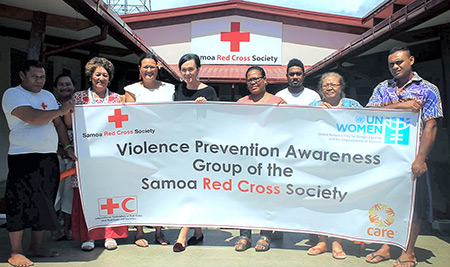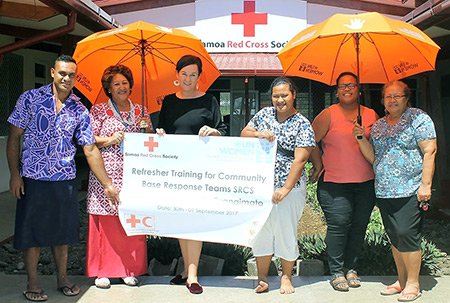Ensuring Women’s Participation in Humanitarian Action
Date:
Apia, Samoa — “Samoa can be a leading example for other Red Cross Societies in the Pacific region, with humanitarian assistance that recognizes the different needs of women, children and people with disabilities and involves them actively in the process,” Samoa Red Cross Society (SRCS) Secretary General Namulauulu Tautala Mauala said.


SRCS is the largest humanitarian organisation in Samoa with more than 2,200 volunteers supporting local communities.
SRCS is one of four Pacific organisations that UN Women is supporting through the Women's Peace & Humanitarian Fund (WPHF) - formerly the Global Acceleration Instrument (GAI) on Women, Peace and Security and Humanitarian Action.
WPHF funding with technical support from UN Women will enable SRCS over the next 24 months to ‘mainstream gender’ with their community volunteers and emergency response teams - meaning that women will be directly involved in planning and action in times of disasters or when other humanitarian assistance is needed.
Women and girls are affected by natural disasters differently than men and boys, and due to pre-existing inequalities, this can make women and girls more vulnerable.
In preparing for severe natural disasters, Namulauulu advised that “SRCS has been working with the government and community partners to make weather forecasting information more accessible to rural communities; develop early warning systems; train emergency response teams; and support evacuation centres with disaster preparedness and response.”
UN Women’s Representative for Fiji MCO, Aleta Miller said “this is an exciting partnership with SRCS and a great opportunity to ensure that humanitarian assistance promotes gender equality and includes all members of society”.“It’s critical that women are part of decision-making processes in disaster response planning, and are at the decision-making table during disaster response - especially in a region with high levels of gender inequality.” Ms. Miller said.
The project will train community volunteers and emergency response teams on gender considerations including collecting data by age and sex during a humanitarian response needs assessment to ensure the most appropriate support is provided such as support to survivors of gender-based violence (GBV) in evacuation centres.
“Thanks to WPHF support, this project will ensure more women participate in emergency response planning at the community level and that gender and diversity are included in all Samoa Red Cross Society tools and planning” said Namulauulu.
WPHF is a rapid financing mechanism supporting quality interventions to enhance the capacity of local women to prevent conflict, respond to crises, and seize key peacebuilding opportunities.
UN Women’s Gender and Protection in Humanitarian Action programme works to strengthen the capacity of humanitarian actors in the Pacific to integrate gender and protection in their work, and to lead the mainstreaming of gender and protection through the entire humanitarian system at national level in countries across the Pacific region.
UN Women Fiji MCO, which assists 14 Pacific Island countries and territories, is working with national organizations to ensure women can participate in, lead and be empowered by humanitarian assistance.
Media Contacts:
Terri O’Quinn,
Humanitarian Communications Officer
UN Women MCO Fiji
Ph: +679 330 1178 ext. 108
Email: [ Click to reveal ]
Jacqui Berrell
Communications and Media Specialist
UN Women MCO Fiji
Ph: +679 330 1178 ext. 125
Email: [ Click to reveal ]
Matthew Rullo
Communications Analyst
Women’s Peace and Humanitarian Fund (WPHF)
New York, Ph: +210 255 0175
Email: [ Click to reveal ]
BACKGROUND
Samoa Red Cross Society: is the largest humanitarian organisation in Samoa with more than 2,200 volunteers supporting local communities. SRCS works with the government and community partners to make weather forecasting information more accessible to rural communities; develop early warning systems; train emergency response teams; and support evacuation centres with disaster preparedness and response.
UN Women’s Gender and Protection in Humanitarian Action programme: The UN Women’s Gender and Protection in Humanitarian Action programme works to strengthen the capacity of humanitarian actors in the Pacific to integrate gender and protection in their work, and to lead the mainstreaming of gender and protection through the entire humanitarian system at national level. Additionally, UN Women aims to strengthen the role of women as key actors in humanitarian action. UN Women provides leadership to the regional Pacific Humanitarian Protection Cluster, bringing together UN agencies, regional and international organisations with local authorities to identify and fulfil the needs of impacted communities.
UN Women Multi-Country Office (MCO) in Fiji: The United Nations Entity for Gender Equality and the Empowerment of Women (UN Women) was created at the July 2010 United Nations General Assembly. A global champion for women and girls, UN Women was established to accelerate progress on meeting their needs worldwide. The UN Women Multi-Country Office (MCO) based in Fiji, covers 14 Pacific Island Countries and Territories (PICTs): Cook Islands, Federated States of Micronesia, Fiji, Kiribati, Nauru, Niue, Palau, Republic of Marshall Islands, Samoa, Solomon Islands, Tokelau, Tonga, Tuvalu and Vanuatu. The Fiji MCO works to progress gender equality and women’s empowerment in the Pacific through four key programmes: Women’s Economic Empowerment; Ending Violence Against Women; Women’s Political Empowerment, Leadership and Human Rights; and Gender and Protection in Humanitarian Action.
Women’s Peace and Humanitarian Fund (WPHF): The Women’s Peace and Humanitarian Fund (WPHF) is a flexible and rapid financing mechanism. It supports quality interventions to enhance the capacity of local women to prevent conflict, respond to crises and emergencies, and seize key peacebuilding opportunities. As the WPHF is a partnership between Member States, UN, and civil society, all stakeholders are represented on its Funding Board. WPHF donors currently include: Australia, Canada, Ireland, Spain, the United Kingdom, Liechtenstein and Lithuania.